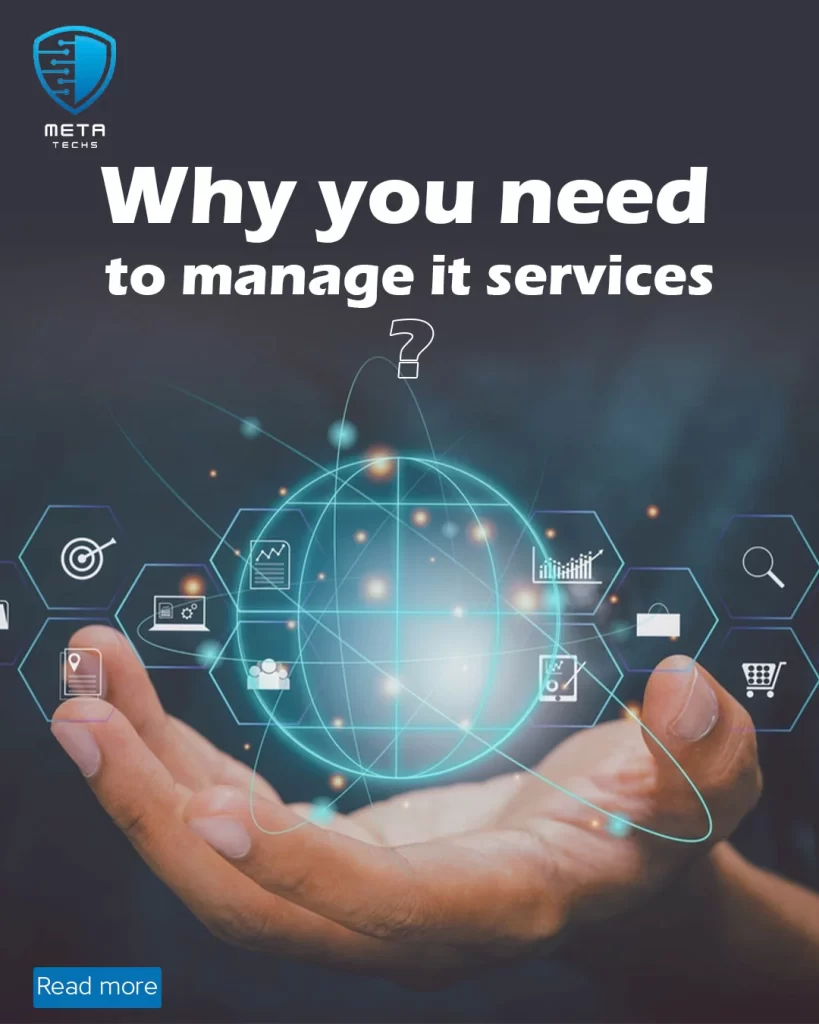We’ve become increasingly to know why you need managed it services as its reliant on technology to run our businesses smoothly and efficiently. From managing databases to securing networks, IT plays a crucial role in driving productivity and growth. However, maintaining an in-house IT team can be costly and challenging, especially for small to medium-sized businesses. This is where managed IT services from providers like Meta Techs come into play, offering a cost-effective solution that streamlines your IT operations and helps you stay ahead of the curve.
In this article, we’ll explore what managed IT services are, why you need them, and the key benefits they offer. We’ll also delve into the various types of managed IT services available, including predictable pricing models, cloud services, and business IT managed services, to help you make an informed decision for your organization.

What are Managed IT Services?
Managed IT Services encompass range of outsourced IT solutions and support provided by Managed Service Providers (MSPs) to businesses and organizations. These services are designed to proactively manage and maintain IT infrastructure, applications, systems, and processes, ensuring optimal performance, reliability, and security while aligning with business goals and objectives. Managed IT Services enable businesses to offload IT management responsibilities to specialized providers, allowing them to focus on core business functions, drive innovation, and achieve strategic objectives.
One of the key aspects of Managed IT Services is proactive monitoring and management of IT assets and resources. This includes continuous monitoring of network infrastructure, servers, workstations, devices, applications, and data centers to detect issues, performance bottlenecks, security threats, and potential vulnerabilities in real-time. Managed IT Services providers utilize advanced monitoring tools, automation, and artificial intelligence (AI) technologies to analyze data, identify patterns, and predict potential issues before they escalate into major disruptions.
It also encompass cybersecurity solutions and practices to protect businesses from cyber threats, data breaches, and malicious attacks. This includes implementing firewalls, intrusion detection systems (IDS), antivirus software, endpoint security, encryption, access controls, and security patches to safeguard sensitive data, networks, and systems. Managed IT Services providers conduct regular security assessments, vulnerability scans, penetration testing, and security audits to identify and mitigate risks, ensure regulatory compliance, and protect against evolving cyber threats.
Managed IT services refer to the practice of outsourcing various IT management responsibilities to a third-party provider, known as a Managed Services Provider (MSP) like Meta Techs. This comprehensive approach involves delegating the maintenance, support, and anticipation of IT needs to improve operations and reduce expenses.
why do you need managed IT services?
The Increasing Importance of Managed IT Services
Managed IT services are becoming increasingly crucial as technology plays a pivotal role in driving business success and transformation. In today’s rapidly evolving digital landscape, in-house IT teams often struggle to keep up with the pace of technological change and the growing demands of businesses. The global managed services market is expected to grow from $223 billion in 2020 to $329.1 billion by 2025, at a CAGR of 8.1%, highlighting the increasing importance of these services for businesses.
Focus on Core Business Functions
Outsourcing IT management to a Managed Service Provider (MSP) allows businesses to focus on their core competencies, strategic initiatives, and revenue-generating activities. It frees up internal resources, reduces operational burdens, and enables businesses to allocate time and resources more effectively.
Security Solutions
Cybersecurity threats are a significant concern for businesses, and Managed firewall Service services provide comprehensive security solutions to protect against cyber attacks, data breaches, and vulnerabilities. They implement multi-layered security measures, regular security assessments, and incident response plans to safeguard critical assets and ensure regulatory compliance.
Continuous Improvement and Innovation
Continuous improvement and innovation are fundamental aspects of Managed IT Services, driving ongoing enhancements, advancements, and value creation for businesses. This continuous process involves analyzing current practices, identifying areas for improvement, and implementing innovative solutions to enhance efficiency, effectiveness, and competitiveness. Managed IT Services providers strive to stay ahead of technological trends, industry developments, and customer expectations, fostering a culture of innovation and adaptability. They collaborate closely with clients, gathering feedback, evaluating performance metrics, and refining strategies to deliver optimal results and drive continuous business growth.
Improved Efficiency and Productivity
contributing to streamlined operations, optimized workflows, and enhanced organizational performance. By leveraging Managed IT Services, businesses can automate repetitive tasks, streamline processes, and eliminate inefficiencies, leading to increased productivity and resource utilization. Managed IT Services providers implement technology solutions, tools, and best practices to enhance workflow efficiency, collaboration, and communication across teams and departments. This results in faster task completion, reduced turnaround times, and improved overall productivity levels. Additionally, Managed IT Services offer proactive monitoring, timely support, and rapid issue resolution, minimizing downtime, disruptions, and productivity losses. They optimize IT infrastructure, applications, and systems to ensure they align with business goals and support peak performance.
Compliance and Risk Management
Compliance and risk management are critical components of Managed IT Services, ensuring that businesses adhere to regulatory requirements, industry standards, and best practices while mitigating potential risks and vulnerabilities. Managed IT Services providers offer comprehensive solutions to help businesses navigate complex compliance landscapes, such as GDPR, HIPAA, PCI DSS, and others, by conducting regular audits, assessments, and security reviews. They implement robust security measures, policies, and controls to protect sensitive data, ensure data privacy, and prevent unauthorized access or breaches. Managed IT Services also focus on risk management strategies, including risk assessments, threat modeling, and vulnerability scans, to identify and mitigate potential threats and vulnerabilities proactively. By addressing compliance and risk management effectively, Managed IT Services help businesses minimize legal and regulatory penalties, protect their reputation, and build trust with customers, partners, and stakeholders.
Focus on Core Business
Focusing on core business activities is a key advantage of Managed IT Services, allowing businesses to concentrate their resources, time, and expertise on strategic initiatives, revenue-generating activities, and core competencies. Managed IT Services providers handle the day-to-day management, maintenance, and support of IT infrastructure, applications, and systems, freeing up internal resources from routine IT tasks. This enables businesses to allocate their talent and resources more effectively towards innovation, product development, customer service, and market expansion. By outsourcing IT management to experts, businesses can streamline operations, improve agility, and respond quickly to market changes, enhancing overall business performance and competitiveness. Additionally, Managed IT Services offer scalability, flexibility, and cost-effectiveness, allowing businesses to adapt to changing business needs and scale operations efficiently without the burden of managing IT internally. Overall, focusing on core business activities through Managed IT Services enables businesses to drive growth, maximize efficiency, and achieve their strategic objectives more effectively.
What are the benefits of managed IT services?
One of the primary advantages is enhanced cybersecurity, as Managed IT Services providers implement robust security measures, such as firewalls, antivirus software, intrusion detection systems, and security patches, to protect against cyber threats, data breaches, and unauthorized access. This proactive approach to cybersecurity helps businesses safeguard their critical assets, sensitive information, and customer data, ensuring compliance with regulatory requirements and industry standards.
Another significant benefits of managed it services is improved operational efficiency, achieved through streamlined processes, automated tasks, and optimized workflows. By outsourcing IT management to experts, businesses can focus on their core activities, strategic initiatives, and revenue-generating functions, leading to increased productivity, faster task completion, and reduced operational costs. Managed IT Services providers also offer proactive monitoring, timely support, and rapid issue resolution, minimizing downtime, disruptions, and productivity losses, thereby maximizing business continuity and operational resilience.
- Access to Specialized Expertise: Managed service providers (MSPs) boast a team of certified experts with diverse skill sets, providing organizations with access to specialized knowledge and experience that may be difficult or costly to acquire in-house.
- Scalability and Flexibility: MSPs offer scalable solutions that can adapt to evolving business needs, enabling organizations to scale their IT resources up or down seamlessly, without incurring additional overhead costs.
- Predictable Spending: By consolidating IT expenses into a fixed operational budget, managed IT services provide predictable and scalable spending, allowing businesses to better plan and allocate resources.
Enhanced Efficiency and Business Continuity
- Proactive Monitoring and Maintenance: MSPs continuously monitor IT systems, identifying and resolving potential issues before they escalate, minimizing downtime and ensuring uninterrupted operations.
- Rapid Response and Support: With 24/7 support and service-level agreements (SLAs), MSPs ensure prompt response times, enabling organizations to maintain productivity even during technical difficulties.
- Robust Security and Compliance: MSPs implement comprehensive security strategies, including data backups, threat monitoring, and compliance management, reducing the risk of data breaches and ensuring adherence to industry regulations.
Meta Techs services in Managed IT Services
Meta Techs, a leading managed IT service provider, offers a comprehensive range of solutions to streamline and optimize your business operations. Their services encompass IT infrastructure planning, help desk support, hosting and cloud services, and IT staffing services.
IT Infrastructure Planning and Management
Meta Techs provides expert guidance in active directory management, VPN design and setup, server maintenance and upgrades, cloud integration, wireless networking, and computer and asset management. Their proactive approach ensures your IT infrastructure remains up-to-date, secure, and aligned with your business goals.
Help Desk Support and Training
Meta Techs’ help desk support services include remote technical assistance, tutorials, training, and on-site repairs. Their knowledgeable team is dedicated to resolving IT issues promptly, minimizing disruptions and ensuring your team stays productive.
Hosting and Cloud Services
secure offsite backups, website hosting, hosted servers and applications, private/secure email, and QuickBooks hosting. By leveraging their cloud services, you can benefit from scalable and flexible solutions tailored to your specific needs.
FAQs
1. What are the benefits of using a managed IT service provider?
Managed IT services, offered by skilled providers, enable organizations to concentrate on their primary goals. These services provide essential skills and expertise, optimize operational costs, support scalable growth, and prevent expensive downtime. They also ensure that IT services are dependable and available around the clock.
2. How do managed IT services contribute to the success of a business?
Managed IT services involve delegating IT management and support tasks to a specialized third-party provider, known as a Managed Service Provider (MSP). These providers are tasked with the continuous monitoring, maintenance, and enhancement of your IT infrastructure. This arrangement allows businesses to focus more effectively on their core competencies.
3. Why is a Managed Service Provider (MSP) essential for companies?
A Managed Service Provider (MSP) plays a critical role in monitoring and maintaining a company’s IT infrastructure. They handle daily IT tasks, enabling small businesses to save time and focus their efforts on strategic initiatives rather than IT management.
4. What distinguishes managed IT services from regular IT services?
The main distinction between managed IT services and traditional IT support lies in their frequency and scope. While IT consultants address specific, immediate problems, managed IT services provide continuous support designed to prevent issues before they arise.








